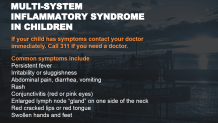What to Know
- The Centers for Disease Control and Prevention has confirmed the link between COVID-19 and a rare, potentially deadly syndrome in children
- The syndrome has now been reported in nearly half the nation's states, including New York, New Jersey and Connecticut. New York City alone now has 89 officially confirmed MIS-C cases by the CDC definition
- Symptoms include persistent fever, abdominal pain, diarrhea, enlarged lymph nodes and swollen hands and feet, among others
Less than two weeks after the CDC confirmed a link between coronavirus and a new, potentially deadly syndrome in children, New York is investigating at least 179 cases of the illness as of Thursday. Gov. Andrew Cuomo says he fears that's just the "tip of the iceberg."
The cases span a wide age demographic, affecting infants to young adults, though most cases are in kids age 1 to 14. Three children in New York have died. Ninety-three percent of the kids displaying symptoms tested positive for COVID-19 or its antibodies.
Children have been less affected by COVID than adults overall; people younger than 20 account for just 1 percent of New York's total hospitalizations. But the emergence of the syndrome has prompted the medical community to rethink how it looks at COVID and kids.
Cuomo has said his administration is reevaluating potential guidelines for summer camp -- and looking even farther, at school in September -- in light of the new illness.
Cases of multisystem inflammatory syndrome in children (MIS-C) have now been identified in nearly half the nation's states, just weeks after News 4 first drew attention to the emerging illness in New York.
Get Tri-state area news delivered to your inbox.> Sign up for NBC New York's News Headlines newsletter.
New York City officials confirmed to News 4 last week that the city now officially has 89 cases of MIS-C, based on the CDC's definition of the syndrome, as well as another 43 cases under investigation. (The city had originally reported a higher number using an older definition of the condition, but had said it would restate its numbers to conform to the new CDC standard.)
News
New Jersey's total stands at 26 MIS-C cases; the state reported no new ones on Thursday. Six children remain hospitalized; no deaths have been reported. A pediatric cardiologist at Newark Beth Israel Medical Center said last week his hospital alone was treating 12 very sick children, suggesting the number of cases in the state may be undercounted.
"We're all desperately hoping it slows down soon," said Dr. Rajiv Verma. "I have talked to at least two teenagers who are scared that they're going to die. I don't lie to them. I tell them this is a very serious illness but we'll do our best to keep them alive."
Symptoms of the syndrome include persistent fever, irritability or sluggishness, abdominal pain, diarrhea, vomiting, rash, conjunctivitis, enlarged lymph node on one side of the neck, red cracked lips or red tongue and swollen hands and feet.

Unlike COVID-19, a respiratory disease, MIS-C affects blood vessels and organs and has symptoms similar to Kawasaki disease and toxic shock. It involves a “hyper response” of the child’s immune system to the virus that can lead to inflammation of the blood vessels, and affect the heart’s arteries, leading to coronary aneurysm. It likely took time to identify the apparent connection to the virus because it targets different systems and manifests in different symptoms.
Early detection can prevent serious illness or death, officials say. Dr. Verma agrees, saying that while the experience can be traumatic for someone so young to go through, most children can recover fully if they are treated quickly.
New York City Mayor Bill de Blasio has put out a comprehensive fact sheet for parents and launched a citywide ad blitz advising them of the symptoms. Cuomo, meanwhile, told hospitals to prioritize COVID-19 testing for kids who present with them.
The CDC issued a recent health alert to physicians providing them with diagnostic guidance. The diagnostic criteria for MIS-C include a fever of at least 100.4 degrees for at least 24 hours, evidence of inflammation in the body and hospitalization with problems in at least two organs (such as the heart, the kidneys or the lungs). The CDC also requires a positive test for COVID-19, the antibodies, or a known exposure within four weeks before symptom onset.



